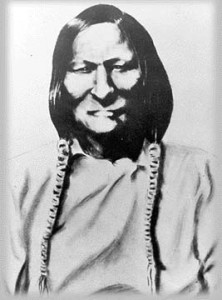Today we lament the death of Black Kettle, chief of the Southern Cheyenne, killed 147 years ago when Lieutenant Colonel George Armstrong Custer led the 7th Cavalry in a surprise dawn attack on the sleeping Cheyenne camp – massacring over one hundred men, women and children. Black Kettle and his wife were shot in the back as they tried in vain to flee across the river in the final moments of the so-called Battle of Washita, though many historians more rightfully refer to it as the Washita Massacre. This pre-meditated and unprovoked attack against Chief Black Kettle and his people was part of the U.S. army’s “winter warfare” campaign, cruelly conceived to destroy the Native Americans’ ponies, supplies and shelters, with the ultimate goal of driving the tribes onto barren reservations – two hundred miles away from the nearest buffalo herds – in order to free the Great Plains for white settlement.
In stark contrast to his more celebrated Native American warrior contemporaries Crazy Horse, Sitting Bull and Geronimo, Black Kettle was the only influential Great Plains chief devoted to securing an honourable peace – having prophesized that the white man could not be defeated. But his efforts to negotiate with the United States federal government and army resulted only in broken promises and betrayal. Two years before Washita, Black Kettle had been the target of and survived another infamous massacre at Sand Creek. Without warning or provocation, over two hundred non-aggressive Cheyenne and Arapahos – mainly women and children – were ruthlessly slaughtered, sexually mutilated and scalped by 700 U.S. troops; the victims’ body parts later exhibited as trophies to roaring crowds. U.S. military leaders erroneously and cynically attempted to blame Black Kettle in order to justify both the Sand Creek and Washita massacres, and the mainstream press in turn portrayed the chief as a warmonger. It is only in recent years that his reputation as a visionary peacemaker has been restored.
The murder of Black Kettle at Washita would prove to be a watershed in the Indian Wars – for, as historian Richard Hardoff wrote, Black Kettle was “the best friend the Whites ever had.” His death confirmed that peaceful negotiation was impossible, and subsequently united all the Plains tribes in their resistance to the white man’s invasion – culminating in the Battle of Little Bighorn in 1876. But whether they waged war or – like Black Kettle – sought peace, the sad truth as we now know it is the white man had but one goal and would not rest until all the Indians were scattered on dawn’s highway bleeding.



15 Responses to 27th November 1868 – the Death of Black Kettle